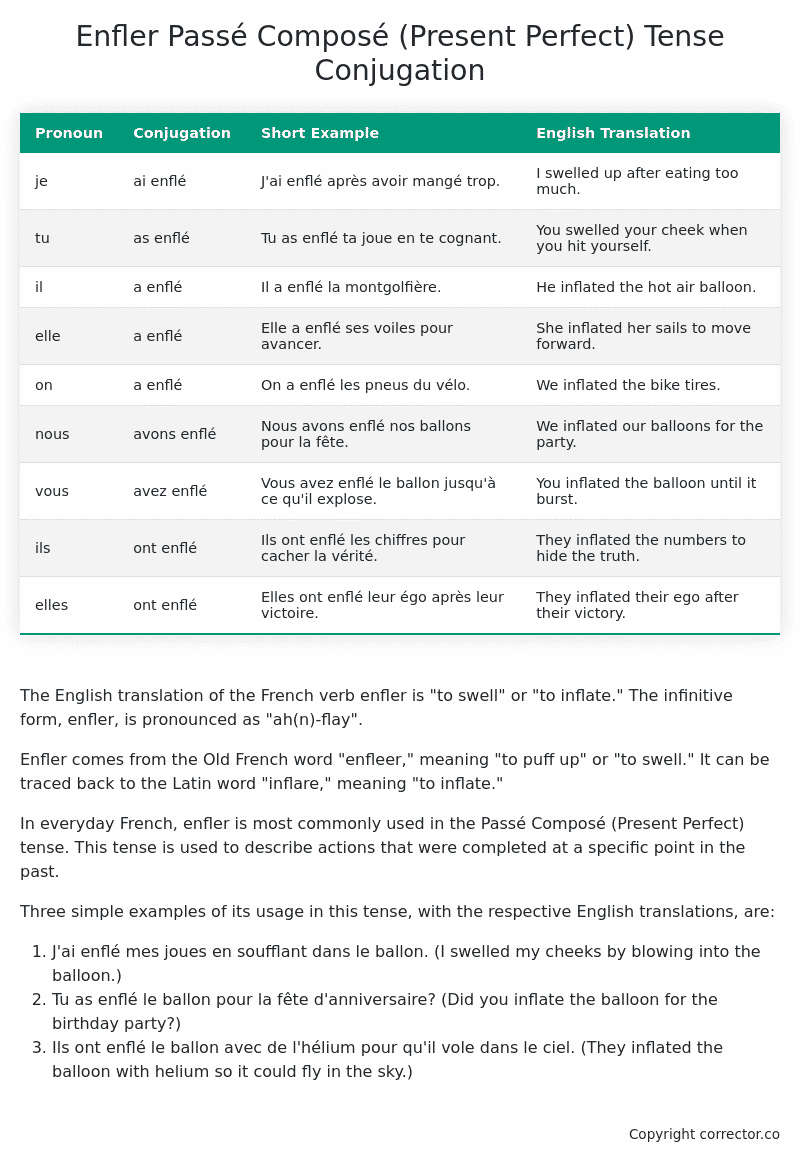Passé Composé (Present Perfect) Tense Conjugation of the French Verb enfler
Introduction to the verb enfler
The English translation of the French verb enfler is “to swell” or “to inflate.” The infinitive form, enfler, is pronounced as “ah(n)-flay”.
Enfler comes from the Old French word “enfleer,” meaning “to puff up” or “to swell.” It can be traced back to the Latin word “inflare,” meaning “to inflate.”
In everyday French, enfler is most commonly used in the Passé Composé (Present Perfect) tense. This tense is used to describe actions that were completed at a specific point in the past.
Three simple examples of its usage in this tense, with the respective English translations, are:
- J’ai enflé mes joues en soufflant dans le ballon. (I swelled my cheeks by blowing into the balloon.)
- Tu as enflé le ballon pour la fête d’anniversaire? (Did you inflate the balloon for the birthday party?)
- Ils ont enflé le ballon avec de l’hélium pour qu’il vole dans le ciel. (They inflated the balloon with helium so it could fly in the sky.)
Table of the Passé Composé (Present Perfect) Tense Conjugation of enfler
| Pronoun | Conjugation | Short Example | English Translation |
|---|---|---|---|
| je | ai enflé | J’ai enflé après avoir mangé trop. | I swelled up after eating too much. |
| tu | as enflé | Tu as enflé ta joue en te cognant. | You swelled your cheek when you hit yourself. |
| il | a enflé | Il a enflé la montgolfière. | He inflated the hot air balloon. |
| elle | a enflé | Elle a enflé ses voiles pour avancer. | She inflated her sails to move forward. |
| on | a enflé | On a enflé les pneus du vélo. | We inflated the bike tires. |
| nous | avons enflé | Nous avons enflé nos ballons pour la fête. | We inflated our balloons for the party. |
| vous | avez enflé | Vous avez enflé le ballon jusqu’à ce qu’il explose. | You inflated the balloon until it burst. |
| ils | ont enflé | Ils ont enflé les chiffres pour cacher la vérité. | They inflated the numbers to hide the truth. |
| elles | ont enflé | Elles ont enflé leur égo après leur victoire. | They inflated their ego after their victory. |
Other Conjugations for Enfler.
Le Present (Present Tense) Conjugation of the French Verb enfler
Imparfait (Imperfect) Tense Conjugation of the French Verb enfler
Passé Simple (Simple Past) Tense Conjugation of the French Verb enfler
Passé Composé (Present Perfect) Tense Conjugation of the French Verb enfler (this article)
Futur Simple (Simple Future) Tense Conjugation of the French Verb enfler
Futur Proche (Near Future) Tense Conjugation of the French Verb enfler
Plus-que-parfait (Pluperfect) Tense Conjugation of the French Verb enfler
Passé Antérieur (Past Anterior) Tense Conjugation of the French Verb enfler
Futur Antérieur (Future Anterior) Tense Conjugation of the French Verb enfler
Subjonctif Présent (Subjunctive Present) Tense Conjugation of the French Verb enfler
Subjonctif Passé (Subjunctive Past) Tense Conjugation of the French Verb enfler
Subjonctif Imparfait (Subjunctive Imperfect) Tense Conjugation of the French Verb enfler
Subjonctif Plus-que-parfait (Subjunctive Pluperfect) Tense Conjugation of the French Verb enfler
Conditionnel Présent (Conditional Present) Tense Conjugation of the French Verb enfler
Conditionnel Passé (Conditional Past) Tense Conjugation of the French Verb enfler
L’impératif Présent (Imperative Present) Tense Conjugation of the French Verb enfler
L’infinitif Présent (Infinitive Present) Tense Conjugation of the French Verb enfler
Struggling with French verbs or the language in general? Why not use our free French Grammar Checker – no registration required!
Get a FREE Download Study Sheet of this Conjugation 🔥
Simply right click the image below, click “save image” and get your free reference for the enfler present perfect tense conjugation!

Enfler – About the French Passé Composé (Present Perfect) Tense
Formation of the Passé Composé
Set the auxiliary verb with either
Conjugate the auxiliary verb
Add the past participle
Common everyday usage patterns
Narrating Past Events
Sequential Actions
Describing Completed Actions
Interactions with other tenses
Imperfect Tense
Conditional and Future Tenses
Summary
I hope you enjoyed this article on the verb enfler. Still in a learning mood? Check out another TOTALLY random French verb conjugation!


